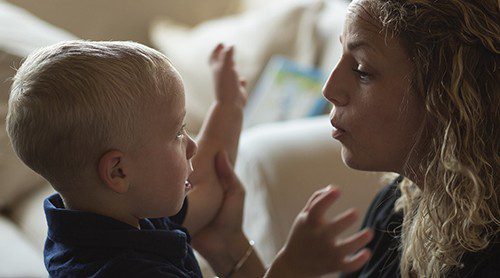Learning a second language can boost a child’s brain and confidence.
In a letter home from the mission field, Sister Michaela A. Shurts (’17) explained her trouble getting Germans to believe her—at least when she tells them she’s American. “Today while we were on the train, I met an older lady. She was completely taken aback when I told her that I was an American. She was one hundred percent sure that I was German. This special ability has opened many doors and hearts.” All thanks to a home where she was raised bilingually.
Neither of Michaela’s parents, Kristina “Nina” Price (BA ’92, TESL ’93, MA ’95) or Karl B. Shurts (BA ’92), is a native German speaker. English is the first language for both. And yet they are raising their eight children to be bilingual in German and English. Nina had spent some time as a child in Germany before earning degrees in German teaching and language acquisition from BYU. She and her husband knew well the research showing benefits to children of being bilingual, including improved ability to focus, heightened creativity, increased cultural awareness and acceptance, higher job marketability, and a decreased likelihood of dementia later in life.
“There is a sense of pride the kids have because they can speak another language,” says Nina Shurts, who writes the blog Bringing Up 8 Bilingual Babies—Bilingual Parenting in a Non-Native Language. “Their ability to speak two languages has defined who they are and how they think of themselves.”
Cindy C. Brewer (BA ’90, MA ’91), a BYU associate professor of German studies, and her husband are also parenting their children non-native bilingually, and she believes it is “not an exaggeration” to say that their children will have the skills to become “ambassadors of peace—bridging the linguistic, cultural, and political divide between nations.”
These experts believe that any parent can successfully create a bilingual household if they follow several basic principles.
Maman et Papa en Harmonie
In two-parent households, it’s critical that Mom and Dad be on the same page about bilingual parenting. This includes the decision about which language to add. The language itself doesn’t matter, Shurts says: “Children can learn any language, even an obscure one. But it’s a good idea to choose a language that is close to your heart.” This language will become a part of your family’s identity and culture, so she recommends choosing one that both parents believe will sustain their interest long-term.
When parents are enthusiastic about both the chosen language and the idea of bilingual parenting, their attitude can be contagious “and allows the kids to grow up feeling proud of their unique and special bilingual situation,” Shurts says.
Inizia Presto (Start Early)
Shurts says her number-one principle in establishing a bilingual household is starting early, creating a family culture where speaking the target language feels normal and comfortable. As a non-native speaker yourself, she says, you don’t have to know much of the language to begin speaking to a newborn. You can learn along with the baby. But Shurts warns, “It is very difficult to switch to the target language once your child feels comfortable speaking to you in your native language.”
It’s particularly important to push the target language before a child enters school. By then the language spoken in your community has a “huge influence,” says Shurts.
規則 (Rules)
Equally important is establishing language rules and sticking to them. For instance, parents can set a boundary, such as your home, where you speak only the target language (possibly with an exception when guests visit).
Or the rule can be based on a person. For example, Brewer always speaks German to her children and her husband always speaks English. The Brewers maintain this “one parent, one language method” even when others are around (though they will offer a translated summary to avoid awkward situations). “If we just spoke whatever language we felt like at any given moment, our children would get confused about where one language starts and the other ends. Then they could get frustrated and might reject the language. You want your child to have a positive experience, so make it easy on them and keep the boundaries clear.”
Parents can also enlist help. Including or adding friends who are native speakers of your target language and inviting them often to your home boosts exposure. Arranging a play group with other children who speak or are learning the target language is also helpful. Many computer programs and apps are available that can help you teach the target language.
Imperfecto Está Bien
Some parents might doubt that their second-language ability is good enough to even try bilingual parenting. Shurts insists that an imperfect second language is better than no second language. “They can choose whatever level they’d like to achieve with their children. Even if a parent only speaks a foreign language to his or her child for a few years, that child will still receive some amazing cognitive benefits.” She suggests making a careful and realistic decision about your language goals. Not every family will want to aim for fluency.
Children will naturally lean away from the less familiar target language, and parents can gently guide children back. Whenever Brewer’s son speaks to her in English, she reminds him to use German. If he’s struggling to express himself, she’ll help by filling in missing words. “Sometimes I give him the whole sentence, which he then repeats back to me, and then we go on with the conversation with patience and encouragement. We never let this turn into a power struggle. We just remain calm and help them to say it in the right language. Eventually this becomes automatic for everyone.
भविष्य के लाभ (Future Benefits)
Brewer says she can’t count the number of people who see her kids’ abilities and lament the fact that they can’t speak their parents’ or other ancestors’ native languages. “The ability to speak a different language expands your mind, priming it for all sorts of different intellectual skills. It pops your academic development into high gear, and it expands your universe to encompass dozens of new ideas, cultures, and aptitudes.”
Shurts says that over the years, she has come to see that one of the greatest benefits to her children being raised bilingually is their appreciation of another culture and people. She believes that a culture cannot be truly understood without learning its language. Because her children have read many German books in German, watched many movies in German, and talked to so many Germans in German, they have developed a deep love for the German people.
“Our bilingual parenting efforts have been more rewarding than I ever thought they would be,” she says. “It has opened their minds to see that there are many different ways of speaking, thinking, and doing things. I especially love that our bilingualism has helped our family feel connected and special and has given us a core identity. It’s how we roll.”
“It hasn’t been easy, but it also hasn’t been super hard,” Shurts says. “It was definitely more difficult at the beginning, but with time it becomes completely natural and you can hardly imagine parenting any other way.”
Ein Ansatz (One Approach)
While the Shurtses use the Minority Language at Home method of bilingual parenting, there are other effective ways. More important than any particular method is consistency, along with clear and defined language boundaries. Shurts boils down her family’s approach as follows:
• Speak the target language to the children from birth but allow the “community language”—in this case, English—among the teenagers and adults.
• Speak to the children in the target language but speak English to each other.
• Speak English in public and encourage the community language when others do not understand.
• Choose most of the children’s books and movies in the target language.
• When the child becomes a teenager, the home communication language with that child naturally switches to English. Even though the older children and parents speak English to each other, they still speak only the target language to the younger siblings.
• Keep all family routines in the target language, including family prayer, scripture reading, and family home evening.









